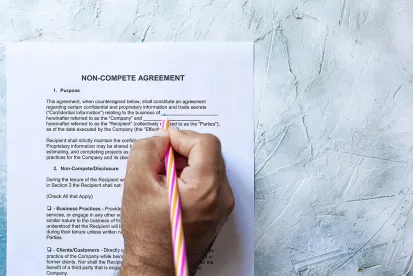In early May 2022, the New Jersey Legislature introduced a comprehensive bill seeking to regulate and limit the use of non-compete agreements in a multitude of ways. Importantly, if enacted Bill A3715 would require employers to provide 30 business days’ notice of the terms of the non-compete, either before commencement of employment or before the agreement is to become effective. Likewise, A3715 would seek to codify common law regarding the scope of a non-compete, requiring that restrictions be no broader than necessary to protect the employer’s legitimate business interests.
Notably, like the Massachusetts Non-Compete Act, A3715 would require explicit written notice in the agreement that an employee has the right to consult with counsel before signing. Similarly, the proposed bill provides that employers may not use a choice of law provision to avoid the act’s requirements.
Regarding post-employment enforcement, A3715 would limit the temporal scope of non-competes to 12 months following the date of termination. The bill would provide that restrictive covenant agreements with employers cannot restrict an employee from performing work for a customer or client of the employer, provided “the employee does not initiate or solicit the customer or client.” The proposed law also would require employers to provide notice of their intent to enforce the non-compete no later than 10 days after termination. Most notably, the new proposed bill contains a garden leave-type provision that is extremely favorable to employees. This specific provision would require an employer to pay an employee 100 percent of the pay they otherwise would have earned had the employee been able to work to during the restricted period.
A3715 would not apply retroactively to agreements entered into before the bill is enacted. The proposed law would require employers to post a copy of the act in the workplace.
A3715’s varied and sweeping reforms are expected to engender much discussion and debate, and continues the recent trend of many states closely scrutinizing non-competes and attempting to limit the use and enforceability of such restrictions.





 />i
/>i

